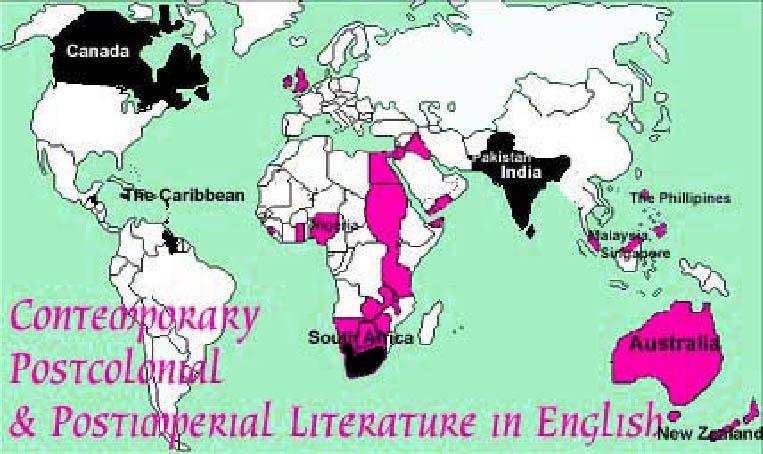World Literatures in English: Race and Gender Relations
in Contemporary Indian Subcontinent, South Africa and the Caribbean Area
Fall, 2002, Kate Liu
 picture adapted from Post_Imperial Web |
||
| Musical Examples |
| As English majors, we need to know
that "English" is not always British, and "American"--not
necessarily the U.S. How about English Literature? British
and U.S. literature? In the past, maybe, but now in the age of postcolonialism
-- definitely no.
English literatures are all the literatures written in English in 1.) the U.S. and U.K., and in 2.) the English-speaking countries in areas ranging from Africa, South Asia, South-East Asia, East Asia (e.g. Hong Kong), South Pacific area (e.g. Australia & New Zealand), the Caribbean area, to North America (e.g. Canada). (See Map above.) To distinguish the latters from the formers, we call the latters -- world literatures written in English, or postcolonial (Third World) literature in English, or New English literatures. Since world literatures written in English cover so many nations with their distinct national/racial cultures, it is hardly possible to generalize about them, not to mention teaching them all in one course. These literatures, however, do have common concerns, their nations having all experienced imperialism and colonization, and their peoples, immigration and frequently more than once. Among the common concerns there are: influences of colonization, possibilities of decolonization and defining national identity, power relations (between the colonizer and the colonized, dominant group and minorities, different genders of different races). These national literatures, moreover, are linked to each other by the large flows of immigrants of Chinese, African and/or Indian descent--what is called Chinese, African and Indian diasporas (離散族群). To do a focused survey of world literatures in English, this course chooses literatures (short stories, novel excerpts and poems) in South Africa, the Indian subcontinent (including Pakistan and India), and the Caribbean area (including Trinidad, Barbados and Jamaica), as well as those by diasporic/immigrant writers from these areas such as Salman Rushdie, Jean Rhys, Michael Ondaatje, V.S. Naipaul., etc. (See the black areas on the Map.) Our central questions are:
Heavy reading
(each week about 50 pages' prose writing or fewer for poems) will be required
to avoid the superficial understanding of these literatures. On the
other hand, history, films (e.g. Salaam Bombay, Wide Sargasso
Sea ), and popular songs (e.g. Bob Marley, rap music) will be used
to help us visualize, enter and understand their cultures. You are
also encouraged to bring in other relevant texts from popular culture of
these areas.
|